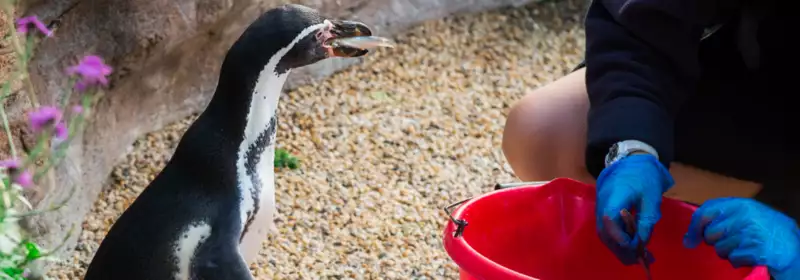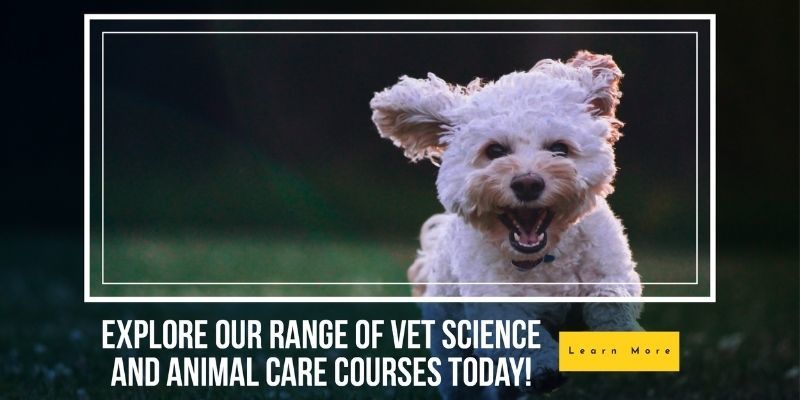When choosing a career working with animals, you really are spoilt for choice. The number of jobs in animal care and other animal-related lines of work is huge. You could become anything from a Zookeeper to a Dog Groomer, Veterinary Support Assistant or a Canine Trainer. The beauty of animal careers is that so many of these roles are accessible without higher level studies, like a degree.
Not needing a degree means a career change becomes a more viable option. You don’t have to invest years into additional study, or thousands of pounds on course fees before reaching your end goal of working in jobs to do with animals. These are common reasons why people decide against university and miss out on the chance to pursue their ideal career.
Though, with so many opportunities on offer in the animal sector, it’s well worth spending some time researching what jobs involving animals would be the right one for you.
Every animal career is different, as is the route into them, but each has a focus on helping animals in some way and enhancing their lives. So if you’re looking for a career that’s both rewarding and enjoyable, we’ve detailed a few animal jobs UK residents can consider.
Working with Domestic Animals
Many jobs in the animal sector focus on the care of domestic animals like cats and dogs. And with an estimated 44% of UK households having pets, it’s not hard to see why there are so many animal jobs that cater to their needs. So whether you’re interested in caring for them in a healthcare sense, exercise, training or otherwise, there are opportunities to suit.
A few examples of popular animal jobs in this area are:
Dog Groomer
Grooming is an essential part of a dog’s care as regular maintenance is proven to improve their health and well-being in a number of ways. As a Dog Groomer, you will check your animal clients for injuries, parasites, infections, and early signs of illness.
You’ll prevent health problems and irritations from occurring by brushing, trimming and maintaining their coat. Besides helping the dog stay cool and comfortable, it allows their skin to breathe, removes grease that can block pores, and stimulates blood circulation.
Helping dogs stay healthy and happy is a very rewarding career for dog lovers. And it’s a career that is continually ranked highly for employees who are satisfied with their work.
You can enter a dog grooming career in multiple ways. Working your way up as an apprentice is one option, but gaining certain Dog Grooming qualifications will position you for entry into the field as a fully qualified Dog Groomer. They take much less time to complete than university degrees and provide you with the knowledge and practical training you need to hit the ground running.
Once qualified, you could secure employment in an existing grooming salon or become self-employed and set up your own business, giving you complete flexibility and control over the way you work in these jobs involving animals.

Dog Trainer
A Dog Trainer can help pets and their guardians build a better relationship to overcome any behavioural challenges they may be experiencing. While their title highlights their expertise with dog behaviour, a lot of the time they have to work with and improve the behaviour of the human carer.
This is because sometimes without proper guidance, they can struggle to effectively communicate with their pets. As a Dog Trainer, it’s your job to show them techniques that will allow them to work with their dogs more effectively. To reduce tensions and behaviours that could make dogs anxious or fearful, which could be leading to the negative behaviours.
A typical day for you in these animal jobs could include teaching classes to multiple dogs and their carers, or providing private lessons. With experience, you could train dogs to complete more complicated tasks such as:
- Search and rescue
- Hunting
- Police work
- Therapy
- Protection
- Detection
You need to reach a certain level of accredited qualifications to gain the membership required to become a certified Canine Behaviourist. This can be achieved through university level study but also through the completion of dedicated courses that specialise in this area.
Veterinary Support Assistant
If you would like to support the health and wellbeing of domesticated pets in addition to wildlife, livestock and other animals, veterinary work is a great option, with many pursuing roles as a Veterinary Support Assistant and Vet Nurse.
A Veterinary Support Assistant plays a vital role in the running of a veterinary surgery. They work closely with Veterinary Nurses and Surgeons to assist them as they deliver preventative treatments and perform life saving procedures on their animal patients.
Aside from this, as a Veterinary Support Assistant, you will groom and feed animals, prepare the operating room, keep records and monitor the inpatients.
Becoming a Veterinary Support Assistant doesn’t entail extensive training like other veterinary roles, so there are fewer barriers to entry. Though you’ll still need to know a lot about animal care. To secure employment you will need to provide evidence of a Level 2 regulated qualification or above like this Veterinary Nurse Assistant Level 2 Diploma (RQF).

Working with All Animals
If working with a wider range of animals interests you like wildlife and exotic species, there is also a huge scope of animal jobs available. Many of which enable you to experience them up close and contribute to the continuing existence of those that are endangered.
Some of these roles include:
Zookeeping
A role that is incredibly popular with those who want to care for all manner of marvellous and majestic species. Zookeepers look after the broad range of animals that reside in zoos, ensuring their health and wellbeing by maintaining their living areas, providing enrichment, a nutritious diet and monitoring their conditions.
Modern zoos are heavily involved with conservation initiatives. So much of your work in these animal welfare jobs will revolve around safeguarding and increasing the numbers of endangered species. You will also educate zoo visitors about conservation challenges and what the zoo is doing to help.
It’s a competitive field so you need to stand out against the high number of applicants that apply. While degree level study isn’t essential, a particular skill set is. Studying courses specific to the vocation can help you develop this. A Level 3 Diploma in Zookeeping, for example, provides you with the theoretical knowledge and practical skills that align you to the role.

Conservation
If you want to focus on helping these animal species in their natural habitats, you could work in conservation. There are many jobs involving animals that fall under this catch-all term, and each strives to protect and prolong the lives of wild animals.
Depending on your role, you could be raising awareness of the activities that are leading to species extinction, rehabilitating animals or collecting data on animal populations. This could be biological samples, behavioural observations and monitoring population levels, all of which helps determine future conservation initiatives.
The great thing about the number of opportunities in this area is you can find a role to suit your interests. For example, if you’re fascinated by African wildlife, there are courses you can take that give you detailed knowledge in that area.
Conservation roles are also highly competitive. So courses related to conservation will help you build the specific skillset required to stand out against other applicants.
Study Online
By studying targeted courses, you can align yourself to any number of jobs working with animals. If you’re also looking for a flexible way to learn that doesn’t require commitment to a college timetable, online courses are a popular option.
You can gain the skills and knowledge needed for an animal career from home. And where practical training is incorporated in the course, this can also be taken place at a time that suits you.
This enables you to work towards a new career in jobs to do with animals without having to leave your current job, or find alternative arrangements for childcare. This is a modern approach that allows more people to go back into education to reach their career goals.
Start Today
If you have a passion for animals and want a career without degree level study, we can help.
learndirect is the UK’s leading distance learning provider. Offering many online courses in animal care that will prepare you for an animal-related career.
Find out more about the course options on offer by clicking below. Or you can speak to our advisors about the different ones we have available by calling 01202 006 464 or by contacting us online.
You can also keep track of all animal awareness days and events with our FREE calendar! Download it here.



















